
Western Sahara is a disputed territory on the northwest coast of Africa. About 20% of the territory is controlled by the Sahrawi Arab Democratic Republic (SADR); the remaining 80% is occupied and administered by neighboring Morocco. It has a surface area of 266,000 square kilometres (103,000 sq mi). It is the second most sparsely populated country in the world and most sparsely in Africa, mainly consisting of desert flatlands. The population is estimated at about 500,000, of which nearly 40% live in Morocco-controlled Laayoune, the largest city in Western Sahara.

All data about demographic information regarding Western Sahara are extremely error-prone, regardless of source. Most countries take censuses every ten years, and some every five in order to stay abreast of change and miscounts; the last count was conducted in 1970, and even that data by colonial Spain is considered unreliable due to large nomadic populations.
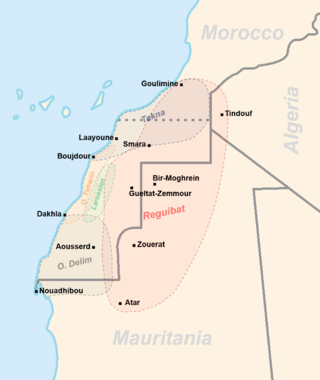
The Sahrawis, or Sahrawi people, are an ethnic group native to the western part of the Sahara desert, which includes the Western Sahara, southern Morocco, much of Mauritania, and along the southwestern border of Algeria. They are of mixed Hassani Arab and Sanhaji Berber descent, as well as West African and other indigenous populations.

Elections in the Sahrawi Arab Democratic Republic are regularly held by the government-in-exile at a national, regional and local level. Elections are considered to be held under a non-partisan participatory democratic regime, as the Sahrawi Arab Democratic Republic (SADR) and the Polisario Front structures are parallel.
The people of Western Sahara speak the Ḥassānīya dialect of Arabic, also spoken in northern Mauritania, and Spanish. They are of mixed Arab, African, many consider themselves to be Arab. Most claim that they descend from the tribe called Beni Hassan, an Arab tribe, who immigrated to the Western Saharan desert in the 14th century. The Sahrawis are Muslims of the Sunni sect and the Maliki law school. Their interpretation of Islam has traditionally being quite liberal and adapted to nomad life.
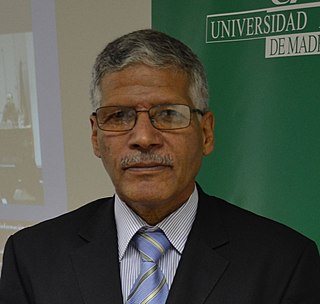
Abdelkader Taleb Omar is a Sahrawi politician who serves as the ambassador of Sahrawi Arab Democratic Republic to Algeria since 17 March 2018. He is a former prime minister.

Scouting exists in Western Sahara both as part of the Fédération Nationale du Scoutisme Marocain as well as independent groups.

Sahrawi Youth Union, also known by its Spanish acronym UJSARIO, is the youth organization of the Polisario Front.
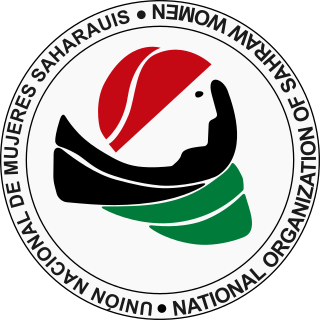
The National Union of Sahrawi Women is the women's wing of the Polisario Front. It was created in 1974, and claims to have 10,000 members, divided between the Sahrawi refugee camps, the Liberated territories, the Moroccan-occupied part of Western Sahara and the Sahrawi diaspora.

Tifariti is an oasis town and the temporary capital of the Sahrawi Arab Democratic Republic, located in north-eastern Western Sahara, east of the Moroccan Berm, 138 km (86 mi) from Smara and 15 km (9 mi) north of the border with Mauritania. It is part of what Polisario Front calls the Liberated Territories and Morocco call the Buffer Zone. It has been the de facto temporary capital of the Sahrawi Arab Democratic Republic since the government moved there in 2008 from Bir Lehlou. It is the headquarters of the 2nd military region of the SADR.

The Sahrawi National Council or Sahrawi Parliament is the legislature of the Sahrawi Arab Democratic Republic. Its structure and competences are guided by the Constitution of the Sahrawi Arab Democratic Republic (SADR). The present speaker since 2020 is Hamma Salama.
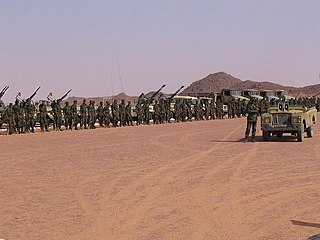
The Western Sahara conflict is an ongoing conflict between the Sahrawi Arab Democratic Republic/Polisario Front and the Kingdom of Morocco. The conflict originated from an insurgency by the Polisario Front against Spanish colonial forces from 1973 to 1975 and the subsequent Western Sahara War against Morocco between 1975 and 1991. Today the conflict is dominated by unarmed civil campaigns of the Polisario Front and their self-proclaimed SADR state to gain fully recognized independence for Western Sahara.

The politics of the Sahrawi Arab Democratic Republic refers to politics of the Polisario Front's proclaimed Sahrawi Arab Democratic Republic, a country in North Africa with limited recognition by other states, controlling parts of the Western Sahara region.
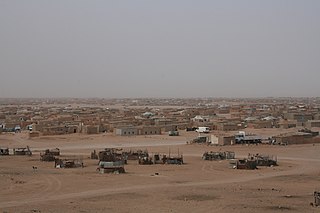
The Sahrawi refugee camps, also known as the Tindouf camps, are a collection of refugee camps set up in the Tindouf Province, Algeria in 1975–76 for Sahrawi refugees fleeing from Moroccan forces, who advanced through Western Sahara during the Western Sahara War. With most of the original refugees still living in the camps, the situation is among the most protracted in the world.
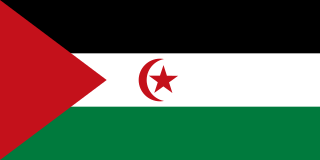
The following outline is provided as an overview of and topical guide to the Sahrawi Arab Democratic Republic:

The 2011 Western Saharan protests began on 25 February 2011 as a reaction to the failure of police to prevent anti-Sahrawi looting in the city of Dakhla, Western Sahara, and blossomed into protests across the territory. They were related to the Gdeim Izik protest camp in Western Sahara established the previous fall, which had resulted in violence between Sahrawi activists and Moroccan security forces and supporters. The protests also purportedly drew inspiration from the Arab Spring and successful revolts in Tunisia and Egypt, although the Arab Spring proper did not reach Western Sahara.
Sahrawi refugees refers to the refugees of the Western Sahara War (1975–1991) and their descendants, who are still mostly populating the Sahrawi refugee camps in Tindouf, Algeria.

Mexico–Sahrawi Republic relations are the current and historical relations between Mexico and the Sahrawi Arab Democratic Republic (SADR). Mexico recognized the SADR on 8 September 1979.

The Sahrawi Arab Democratic Republic, also known as the Sahrawi Republic and Western Sahara, is a partially recognized state, recognized by 46 UN member states and South Ossetia, located in the western Maghreb, which claims the non-self-governing territory of Western Sahara, but controls only the easternmost one-fifth of that territory. Between 1884 and 1975, Western Sahara was known as Spanish Sahara, a Spanish colony. The SADR is one of the two African states in which Spanish is a significant language, the other being Equatorial Guinea.

Sahrawi Arab Democratic Republic–Spain relations are the current and historical relations between the Sahrawi Arab Democratic Republic and Spain.
















